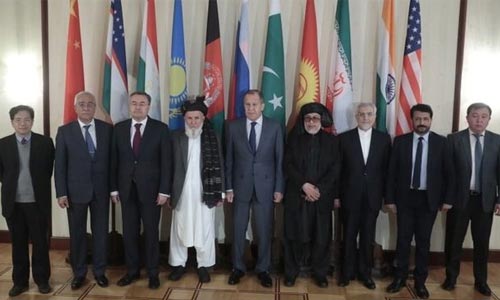Despite the fact that the Taliban have come to negotiating table with the US envoy Zalmay Khalilzad to talk end of 17 years of conflict in Afghanistan, insurgency continues unabated as the Taliban guerilla fighters have intensified their attacks against Kabul government.
Afghanistan, which established the High Peace Council to stress Afghan-led and Afghan-owned peace process with the Taliban’s leadership, feels being sidelined in the talks between US envoy and the Taliban as the two sat around the table without Kabul’s representatives.
The negotiation with US envoy and the ‘Moscow Summit’, in which the Taliban shared the platform with members of Afghan HPC, provided the Taliban with greater international recognition, strengthened their position and boosted their confidence in the battlefield.
The Moscow forum was hosted by a permanent member of the UN Security Council despite the serious reservations of Kabul government, which sent members of HPC rather than diplomats to oversee the forum. The Moscow summit was scheduled for September 4 but delayed after Afghan President Muhammad Ashraf Ghani called Russia to cancel it.
The trip of the Taliban’s delegates to Moscow “was not just to reiterate this position but also to show the US that they have “alternatives”; that is, if Washington does not engage, then the Taliban would seek political and even military support from its perceived competitor, Russia,” said Arkady Dubnov, a Russian expert on Central Asia and Afghanistan.
Although Russia is concerned about its security as the IS group is spreading its tentacles in the region after losing ground in Iraq and Syria, the Moscow summit on November 9 was likely to be symbolic and ended without a positive result. Perhaps it was an indication to the US not to turn a blind eye to the regional stakeholders in Afghanistan’s peace talks. And the Taliban’s positive response to Russia’s invitation was to simply capitalize on the opportunity since they are on the prowl for every chance.
So far, no headway has been made in the negotiations with the Taliban, who have refused to back down from their hardline stance of not negotiating with Kabul government. To bargain for much higher price in the talks with their US interlocutors, the Taliban have intensified their attacks against Afghan government in recent weeks. Meanwhile, they are believed to prevent form Afghanistan’s presidential election, which will be held after six months, through increasing their insurgency and bargaining in their negotiations with US envoy. Rumors say that Khalilzad asked Kabul government for delaying the election, which was reacted negatively by Afghan grassroots and officials. Based on the rumors spread on social media, halting presidential election and establishing a government based on “Sharia” rather than “Constitution” in a national Jirga (assembly) were parts of the Taliban’s preconditions put on the table with US envoy.
It is self-explanatory that the Taliban seek political share in the government and will try to disrupt the upcoming presidential election. However, such a government will not be acceptable by Afghan people, who showed their strong will for democracy through active participation in parliamentary elections despite the life-threating warnings from the Taliban.
It is believed that the wide political rift between Afghan officials in the government’s body on the one hand and the cleavage between state and nation on the other hand have led to the deterioration of security situation in the country and lack of support to Afghan-led and Afghan-owned peace process. The National Unity Government failed to mobilize support from the public and stronger support from the clerics. The life of NUG is coming to end, but not a single challenge of the country has been resolved. Worst of all, the security has been deteriorated.
To strengthen the Afghan-led and Afghan-owned peace process, Kabul government has to win the national support besides the international backup. Now it is too late for the NUG to earn the public support as officials, including President Ghani, are preparing to be nominated for the upcoming presidential election.
Now the US President Donald Trump, who called himself “problem solver”, is in the limbo whether or not to accept the Taliban’s preconditions for pulling out his troops from Afghanistan. It is highly tough decision and hard to trust the Taliban. If Trump’s administration makes a mistake in this regard after the US sacrificed thousands of its soldiers’ lives and billions of dollars, his nation and his successor will strongly denounce him.
Home » Opinion » The Rocky Road of Peace Talks
The Rocky Road of Peace Talks
| Hujjatullah Zia

